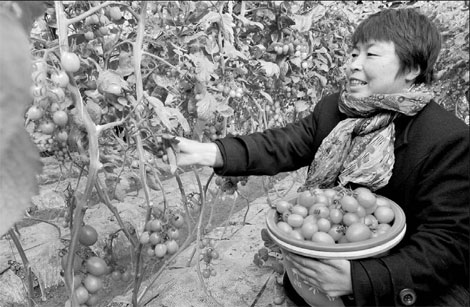Demand for organic food sprouts up at Spring Festival
Updated: 2012-01-26 09:10
By An Baijie and Wang Qingyun (China Daily)
|
|||||||||||
 |
|
A farmer in Zouping county in East China's Shandong province picks organic tomatoes. Dong Naide / For China Daily |
BEIJING / Rizhao, Shandong - Organic food products have become popular New Year gifts as the Chinese are paying more attention to health and food safety.
On Friday in a Wumart supermarket in Beijing's Chaoyang district, Han Yuying, a 53-year-old worker at a nursing home, was trying to select a box full of eggs that, according to the label, were laid mostly by chickens that had dined on natural feed containing no additives.
"I want to send some eggs to my sisters as a Spring Festival gift," Han said. "These boxed eggs are indicative of quality."
The 60-egged box Han bought cost 55.8 yuan ($8.80). That's a higher price than is found at farmers markets, where an egg can often be had for 0.7 yuan.
In a booth at an Ito Yokado supermarket also in the Chaoyang district, a box containing 4 kilograms of organic pork was going for 1,288 yuan.
A salesman said the box was put on sale for the Spring Festival and that it has proved popular among customers.
"A man just ordered three boxes," he said.
Zhang Qiang, manager of Lianshan Black Pigs Farm in Wulian county, Shandong province, which has more than 500 pigs raised on natural foods, said the demand for organic pork rapidly increases around the time of Spring Festival. That recurring trend has caused the company's supply of products to run short this year.
"Organic pork has been chosen as a Spring Festival gift for many large companies, State-owned institutes and some government organizations," Zhang said. "Most of the pork is sold to big cities such as Qingdao and Jinan (both in Shandong)."
Ordinary pork goes for about 25 yuan a kg, while the organic pork at his farm sells for closer to 100 yuan a kg, Zhang said.
Besides organic pork, organic vegetables have become one of the most popular Spring Festival gifts.
Jin Weiran, general manager of Rizhao Yuli Vegetable Co, which has produced and traded organic vegetables for more than three years, said sales of organic vegetable have picked up in recent weeks.
"People are paying more attention to the safety of food nowadays, especially in 2011, when a great number of scandals about substandard food were exposed by the news media," he said.
Jin said the company's organic vegetables are mainly transported to Hong Kong and sold to supermarkets there. But at Spring Festival time, more of his customers tend to come from the mainland.
"More people buy a package of organic vegetables, which costs about 200 yuan, for their friends as the Spring Festival gifts," he said. "And the demand has surpassed our capacity for production. Healthy foods are more welcome than traditional gifts such as wines and cigarettes."
The prices of organic vegetables are usually three to four times greater than those of ordinary vegetables, Jin said.
"The price of organic pumpkins is about 18 yuan a kilogram, and regular pumpkins cost only 6 yuan a kilogram," he said. "Even though the prices are far more expensive, organic vegetables usually sell out in a short time."
Fan Zhihong, an assistant professor at China Agricultural University's college of food science and nutritional engineering, said she believes the increasing popularity of organic food during Spring Festival shows that people want to eat healthier.
"Giving organic food - a box containing different kinds of cereals, for instance - may also serve as a reminder of the importance of having a healthy diet," Fan said.
"But when it comes to nutrition, there is no evidence to suggest that organic food is more nutritional than ordinary food. ... Giving these sorts of presents is more of a way of showing your tastes and expressing your respect toward the recipient."